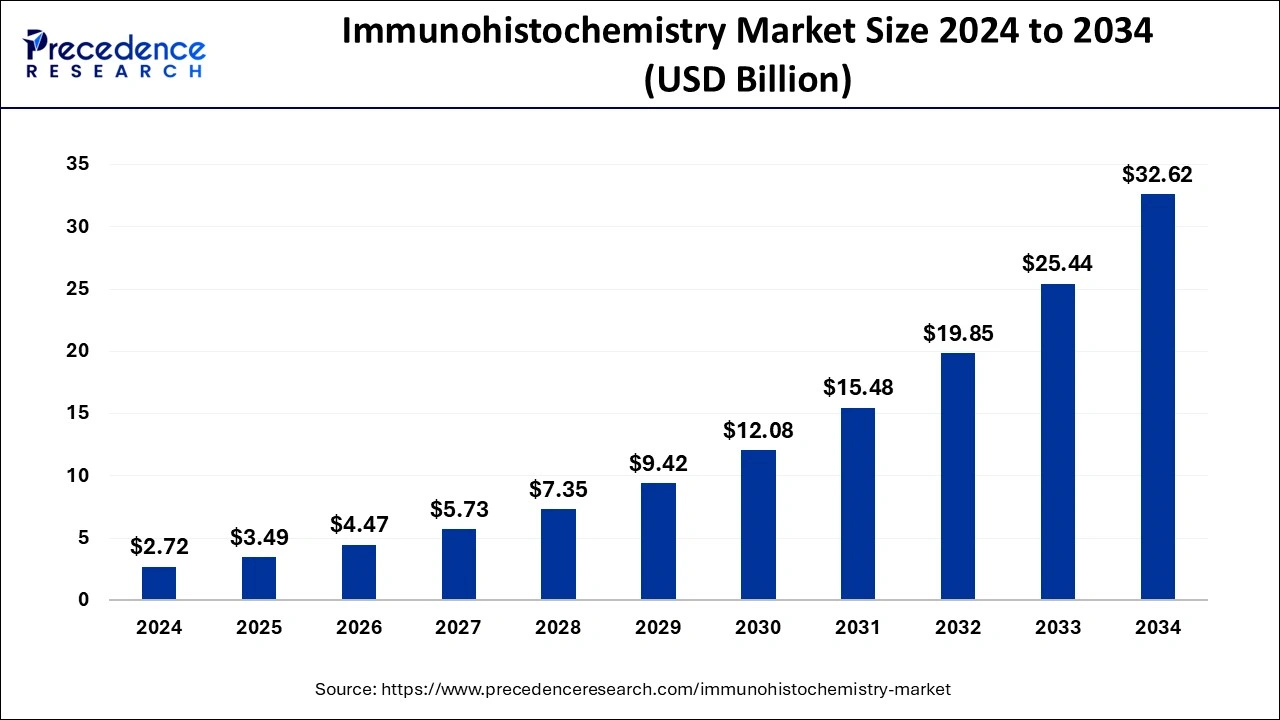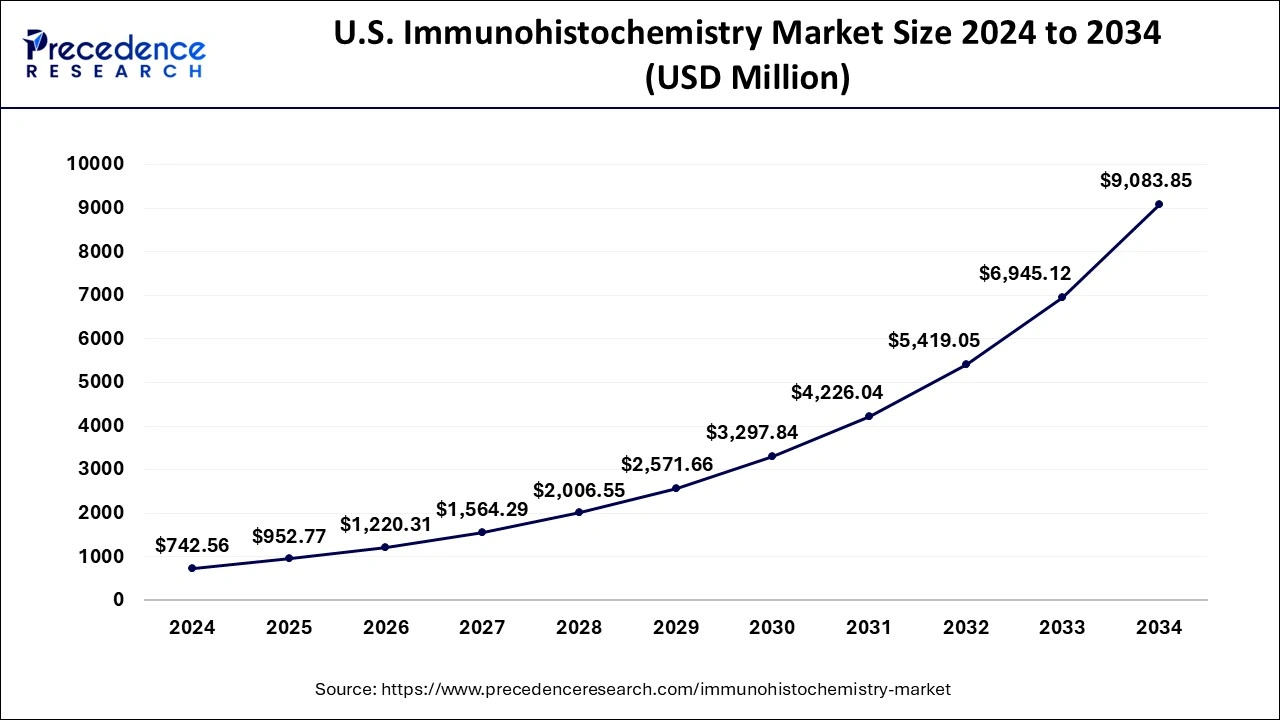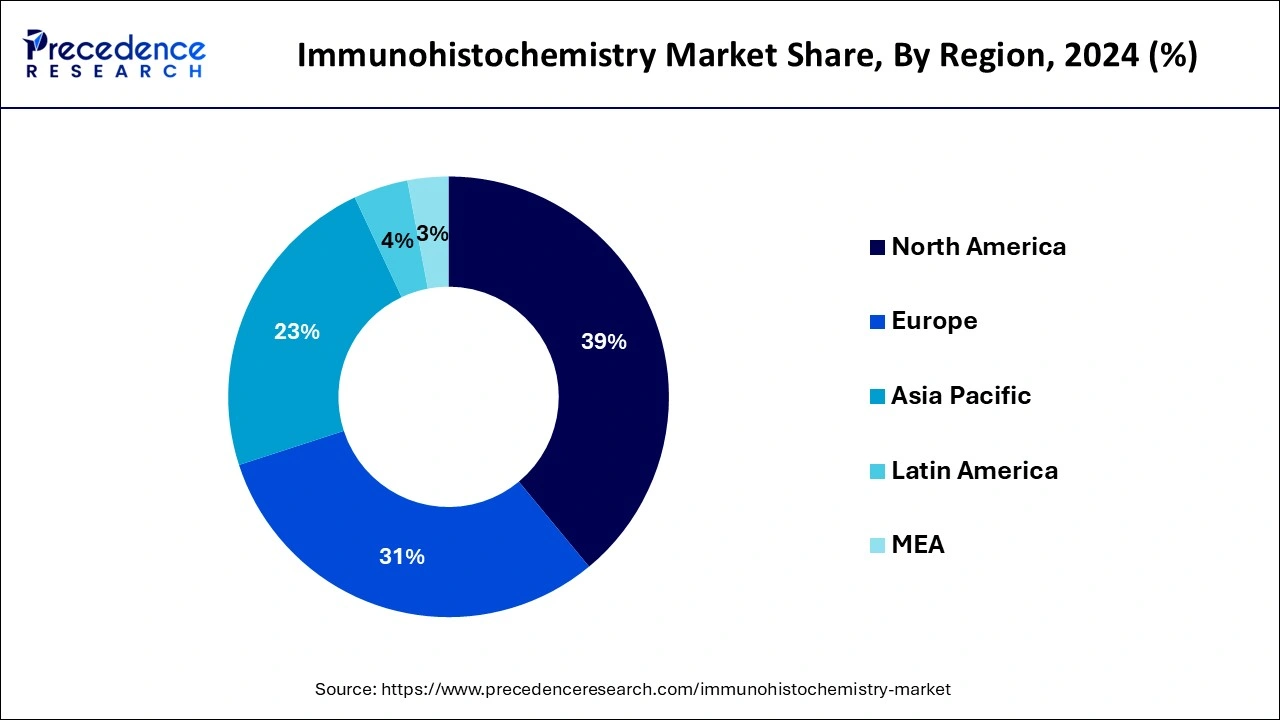The global immunohistochemistry market size was accounted for USD 2.72 billion in 2024, grew to USD 3.49 billion in 2025, and is expected to be worth around USD 32.62 billion by 2034, poised to grow at a CAGR of 28.20% between 2025 and 2034. The North America immunohistochemistry market size was predicted to increase from USD 1.06 billion in 2024 and is estimated to grow at the fastest CAGR of 28.37% during the forecast year.
The global immunohistochemistry market size was expected to be valued at USD 2.72 billion in 2024 and is anticipated to reach around USD 32.62 billion by 2034, expanding at a CAGR of 28.20% over the forecast period from 2025 to 2034. The demand for personalized medicines has increased, leading to driving the growth of the immunohistochemistry market. Rising prevalence of chronic diseases like cancer and infectious diseases is highly contributing to the market expansions. Growing adoption of digital pathology is expected to boost the market in the forecast period.

The integration of AI in research and developments has shown significant influence; the prevalence of chronic disease has witnessed AI as the spectacular helper in research and development of the novel therapies and drugs. Immunohistochemistry is nonexceptional in this. AI is benefiting the immunohistochemistry market by improving personalized medicine developments. The adoption of deep learning and machine learning has made it easier to study and understand the pathology, which further helps to develop precision medicines and targeted therapies.
AI delivering spectacular work in diagnostic identification, identifying potential patients and their needs, risk management, as well as production areas. AI-enabled equipment, like automated the immunohistochemistry-staining process, immunohistochemistry-stained tissue sections, and samples for IHC analysis, making it much easier for developments of the immunohistochemistry test. With the integration of AI, the market is expected to witness more growth areas for research and developments in the upcoming years.
The U.S. immunohistochemistry market size was exhibited at USD 742.56 million in 2024 and is projected to be worth around USD 9083.85 million by 2034, growing at a CAGR of 28.49% from 2025 to 2034.

North America led the immunohistochemistry market in 2024 with revenue share of 39%. Due to advancements in commercialization AND biotech. The increasing use of this immunohistochemistry equipment in diagnostic facilities and laboratories has contributed to the North American region's dominance. Additionally, the adoption of automated devices is increased by favorable reimbursement policies in nations including the United States and Canada, which supports the expansion of the immunohistochemistry market in the North American region.
The United States leads the regional market due to increased prevalence of chronic diseases like cancer in the country. Rising obesity and changing lifestyles are impacting the country's market expansion. Moreover, ongoing technology advancements in molecular biology and pathology fields are unclosing doors for immunohistochemistry utilizations and requirements. Factors like an aging population, rising government initiatives in research & developments, and the presence of favorable pharmaceutical companies and well-established healthcare are significantly driving immunohistochemistry market growth in the United States.

On the other hand, the Asia-Pacific region's immunohistochemistry market is anticipated to experience the fastest CAGR growth during forecasting. The economic growth development of nations like India, China, South Korea, and Singapore is blamed for the rapid expansion of the immunohistochemistry market in the Asia-Pacific region. Aside from these, the high rate of chronic diseases and the rapid ageing of the population are other factors driving the growth of the Asia-Pacific Immunohistochemistry Industry.
Japan is dominating the regional market due to rising government initiatives to reduce the disease burden in the country. Rising prevalence of cancer is the major factor driving growth of the market in Japan. China is the second largest leader of the market in Asia. This growth is anticipated due to rising investments in R&D, an aging population, and expanding advanced healthcare expenditures.
The immunohistochemistry market is expanding due to more products being approved for use and the release of technologically sophisticated immunohistochemistry solutions for disease diagnosis. It is anticipated that the rising prevalence of chronic diseases will raise the demand for immunohistochemistry products, fueling market expansion.
The market for immunohistochemistry is expanding due to a growing emphasis on drug monitoring, better chances of detecting various diseases, technological advancements, and increased public awareness of new diagnostics equipment. The market for immunohistochemistry is predicted to grow slowly due to the low specificity of IHC techniques and their high setup costs. A cancerous growth must be accurately and promptly diagnosed to effectively manage a disease.
However, some chronic diseases cannot be accurately diagnosed using IHC techniques, which may prevent widespread use. Immunohistochemistry market expansion is constrained by the high setup cost of IHC equipment, a significant burden on diagnostic laboratories and hospitals in developing economies.
Additionally, extensive uses of immunohistochemistry in development and drug discovery activities are anticipated to spur revenue growth throughout the forecast period. And whole-slide imaging and Digital image analysis provide accurate and impartial assessments. Image analysis is therefore applicable to various drug discovery processes, such as target validation, biomarkers expression studies, patient stratification, drug repositioning, and efficacy of drugs and safety studies.
| Report Coverage | Details |
| Market Size in 2024 | USD 2.72 Billion |
| Market Size in 2025 | USD 3.49 Billion |
| Market Size by 2034 | USD 32.62 Billion |
| Growth Rate from 2025 to 2034 | CAGR of 28.20% |
| Largest Market | North America |
| Base Year | 2024 |
| Forecast Period | 2025 to 2034 |
| Segments Covered | By Services, By Molecule and By Mode |
| Regions Covered | North America, Europe, Asia-Pacific, Latin America and Middle East & Africa |
The rise in the number of people with chronic diseases.
The rise of the elderly and the rising incidence of cancer are driving factors in the immunohistochemistry market. The IHC market is expected to expand due to additional factors like rising healthcare spending and improved healthcare infrastructure, which will eventually lead to more hospitals and diagnostic labs opening every day.
The market's growth rate is also boosted by using technologically developed immunohistochemistry solutions and expanding drug discovery and development activities.
The global immunohistochemistry market is expected to grow due to increasing product approvals and the emergence of technologically sophisticated immunohistochemistry remedies for disease diagnosis. Additionally, the participation of key players in developing IHC methods through partnerships with pharmaceutical drug companies to create and deliver IHC diagnostic solutions for their immunotherapies presents growth offers for the market players operating in the IHC market. Additionally, it is anticipated that increasing public awareness of chronic diseases will increase the need for immunohistochemistry products, eventually leading to growth in the IHC market.
The market's growth rate is also anticipated to be supported by the use of IHC in detecting several neurodegenerative disorders caused by numerous factors, including cannabidiol use and cigarette smoking.
High level of consolidation
The expiration of antibody patents is a severe issue for the global market. The patent protection for some primary antibodies made and marketed by Merck (Germany) and F. Hoffmann-La Roche AG (Switzerland) is about to expire. As a result, such market participants' total revenue and profitability are declining.
Participants in the market must also deal with issues like heightened price pressure from governments around the world and reduced R&D output. To overcome these challenges, major market players are acquiring smaller and mid-sized competitors with innovative products. This provides a set of economic and distribution platforms for these goods to enter new international markets.
Rise in the demand for personalized medicine.
The rising need for companion diagnostics is contributing to increasing further the adoption of immunohistochemistry. Companion diagnostics are essential for the development of target therapies as they help to identify the patients who need relevant treatments. The advanced technologies like next-generation sequencing and artificial intelligence comply with personalized medicines by helping to identify patients and analyzing genetic mutations. With the rising incidence of chronic disease, the need for targeted and precision treatment options, ongoing research in genes and biomarkers, and the integration of advanced technologies, the research and development of personalized medicines are likely to improve in upcoming years, which will play a favorable role in the IMMUNOHISTOCHEMISTRY market growth.
Due to the crucial role that antibodies play in drug testing and disease diagnosis; the antibodies market was dominated in 2024. In terms of utilisation, monoclonal antibodies and related products such as antibody fragments, Fc-fusion, and antibody-drug conjugates have taken the lead. The antibodies are used in various fields, including hematopathology, neuropathology, and pathology. The kits segment is expected to grow at the fastest CAGR during the forecast period.
The primary antibodies have the highest utilization rate in various research for chronic diseases like cancer, neurologic disorders, and infectious disease diagnosis due to their sensitivity and specificity in identifying biomarkers. Additionally, the secondary antibody uses are rising in multiplex staining IMMUNOHISTOCHEMISTRY applications, making the segment more popular in the market. The ability of recombinant antibodies to enhance consistency and reproducibility is also playing a crucial role in the segment's growth. With ongoing research and developments, the segment is expected to continue leading the market.
On the other hand, the Kits segments are expected to witness significant growth in the forecast period. Due to the convenience of using kits and their simplicity in development and research for educational and biotechnological procedures. Additionally, the sorted kits, which can be utilized without the inconvenience of measuring precise specific antibody stains for tissues, can save a ton of time and aid in preventing human errors during the procedure, fueling demand for the market. Moreover, several major companies are now offering kits and assays as immunohistochemistry R&D increases, driving the segment growth.
Due to the convenience of using kits and their simplicity in development and research for educational and biotechnological procedures, the IHC kits segment is also anticipated to experience severe expansion during the forecast period.
Additionally, the sorted kits, which can be utilized without the inconvenience of measuring precise specific antibodies stains for tissues, can save a tonne of time and aid in preventing human errors during the procedure, fueling demand for the market. Moreover, several major companies are now offering kits and assays as immunohistochemistry R&D increases, driving the segment growth.
By application, the diagnostics segment dominated the global immunohistochemistry market. The increasing incidence and prevalence of cancer primarily drive the segment's growth. The application of immunohistochemistry in cancer diagnosis to detect biomarkers and tumor types is the major reason behind its rapid adoption in cancer diagnosis. Additionally, the increased prevalence of chronic and rare diseases is seeking personalized medicines, where immunohistochemistry helps to identify potential patients to apply the treatment as well as identify biomarkers and targeted therapies.
The majority of infectious diseases and the favourable reimbursement environment for immunohistochemistry tests are additional factors driving the segment's market share growth. Numerous chronic conditions, including autoimmune diseases, cancer, infectious diseases, cardiovascular diseases, diabetes mellitus, and nephrological diseases, can be diagnosed using immunohistochemistry tests. Moreover, it is anticipated that the increasing incidence of chronic diseases will continue drive the diagnostics segment.
Numerous chronic conditions, including autoimmune diseases, cancer, infectious diseases, cardiovascular diseases, diabetes mellitus, and nephrological diseases, can be diagnosed using immunohistochemistry tests. Moreover, it is anticipated that the increasing incidence of chronic diseases will drive the diagnostics market.
The increasing incidence and prevalence of cancer primarily drive the segment's growth. The majority of infectious diseases and the favourable reimbursement environment for IHC tests are additional factors driving the segment's market share growth.
By the end-use, the hospitals and diagnostics laboratories segment accounted for the largest share of the global immunohistochemistry market in 2024. This expansion was anticipated due to the significant number of immunohistochemistry tests conducted in medical facilities. Moreover, the demand for hospitals with cutting-edge institutions has risen due to the healthcare sector's changes. The rise in people embracing technological advancements like digital pathology and automated sample preparation, which have significantly increased value, the segment is projected to witness more growth. Another major factor driving growth of the segment is increased disease diagnosis in the hospitals due to the increase in the incidence of chronic diseases.
However, the research institutes segment is anticipated to post a profitable CAGR during the forecast period due to the technique's numerous benefits over staining methods typically used in pharmaceutical development and research. For instance, Cell Signalling Technology offers a human-specific VISTA rabbit monoclonal antibody authorised by immunohistochemistry for biomedical research. The widespread use of immunohistochemistry methods in drug testing by research institutes can also be credited with the growth. The method enables the evaluation of biomarker distribution and localization and the expression of various proteins in various biological tissue sections, which is carried out in research settings. Research institutions use immunohistochemistry techniques to evaluate drug efficacy tests during drug development, that’s leading the segment to grow further in the market.
“The Ziihera was previously received Breakthrough Therapy Designation from the FDA, and now it has received approval for this indication. It is an advanced modification and offers the first and only dual HER2-targeted bispecific antibody and chemotherapy-free treatment for patients living with BTC.”
“The company's new demonstration shows how the practical application of AI is likely to provide a positive influence on everyday clinical care by satisfying the needs of patients, as treatment choices have become majorly complex.”
By Product
By Application
By End-Use
By Geography
For inquiries regarding discounts, bulk purchases, or customization requests, please contact us at sales@precedenceresearch.com
No cookie-cutter, only authentic analysis – take the 1st step to become a Precedence Research client